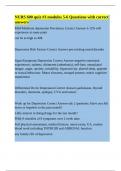NURS 600 quiz #3 modules 5-6 Questions with correct
answers
Mild/Moderate depression Prevalence Correct Answer-5-12% will
experience at some point
can be as high as 40$
Depression Risk Factors Correct Answer-pre-existing mood disorder
Signs/Symptoms Depression Correct Answer-negative emotional
experiences, sadness, disinterest (anhedonia), self-hate, unexplaind
fatigue, anger, anxiety, irritability, hyperactivity, altered sleep, appetite
or sexual behaviour. Motor slowness, stooped posture, minor cognitive
impairment
Differential Dx for Depression Correct Answer-parkinsons, thyroid
disorders, dementia, epilepsy, CVA and tumors
Work up for Depression Correct Answer-ask 2 questions: Have you felt
down or hopeless in the past month?
Little interest in doing things for the last month?
PHQ-9 checklist of 9 symptoms over 2 week time.
Full physical assessment, medical history, neuro exam, UA, routine
blood work including THYROID and ADRENAL function.
any family HX of depression
,Medications that can cause Depression Correct Answer-BP meds,
sedatives, hyponotics, anti seizure, antipsychotics, anti parkinsons,
steroids, analgesics, antibacterials, antineoplastics.
Pharm management for depression Correct Answer-
Non-pharm management for Depression Correct Answer-
Major Depression Risk Factors Correct Answer-female, strong family
history or suicide attempt, etoh abuse, hx of migraines, back pain, recent
MI, peptic ulcer dx, current chronic disease, insomnia, stress, poverty, <
high school education, recent trauma, parent or caregiver with behavior
disorder, hypersecretion of cortisol and coexisting thyroid disorder.
Sign/Symptoms Major Depression Correct Answer-severe negative
changes in mood, thinking and behavior
sadness and apathy
slowed thinking
emotional numbness
substance abuse
social withdrawal
death and suicidal thoughts that persist regardless of circumstances
global thinking is distorted/ circular
loss of energy
anxious distress
, difficult thoughts about future
melancholy
can have psychotic features with catatonic states.
Pharmacologic management of Major depression Correct Answer-
simultaneous use of psycho therapy and medications.
SSRI's, SNRI, NRI, TCA's and DA's
Non pharmacologic management of Major depression Correct Answer-
CBT, home and reassurance, Massage, relaxation therapy, exercise,
good nutrition, self care.
establish a routine, focus on behaviors or activities rather than feelings.
PHSQ-9 scores Correct Answer-0-4 : None
5-9: Mild
10-14: Moderate
15-19: Moderately Severe
20-27: Severe
General Anxiety Disorder Correct Answer-excessive worry over 6
month period of time about multiple concerns that are difficult to control
General Anxiety Disorder Prevelance: Correct Answer-50-90% have co-
morbid depression
Women > Men




